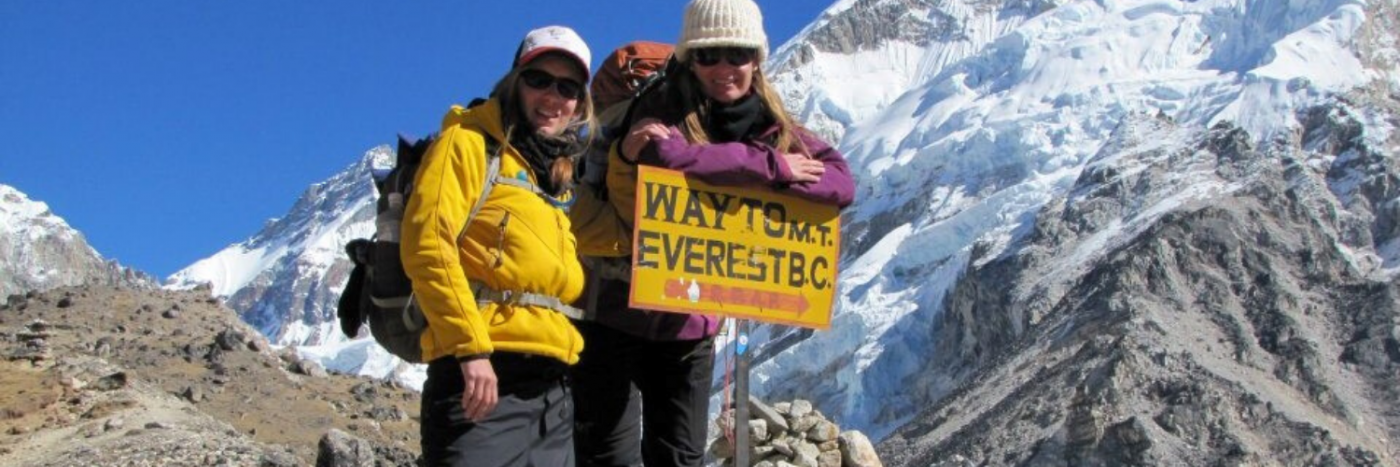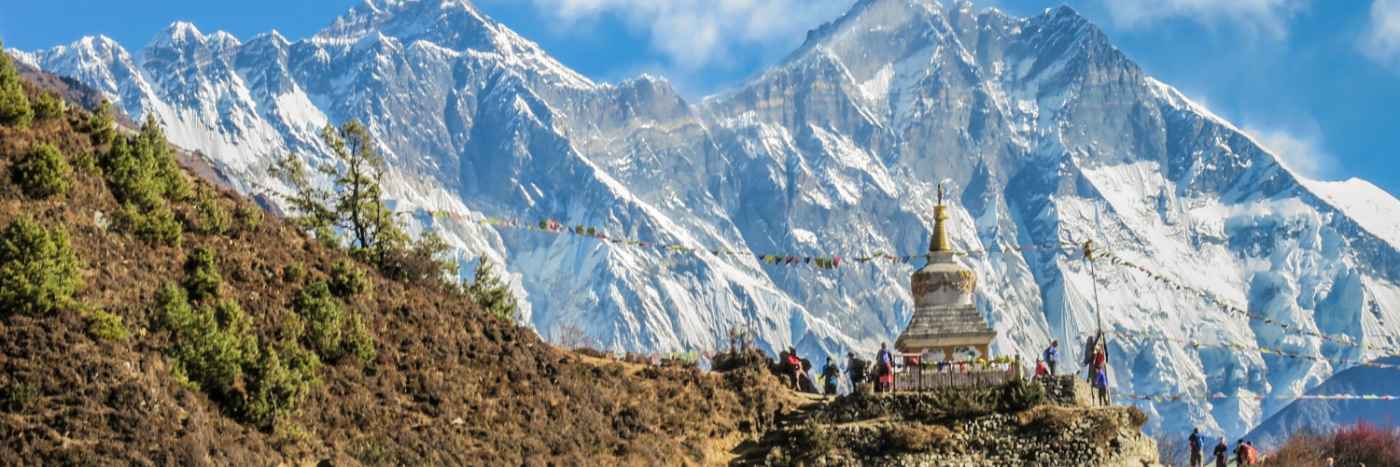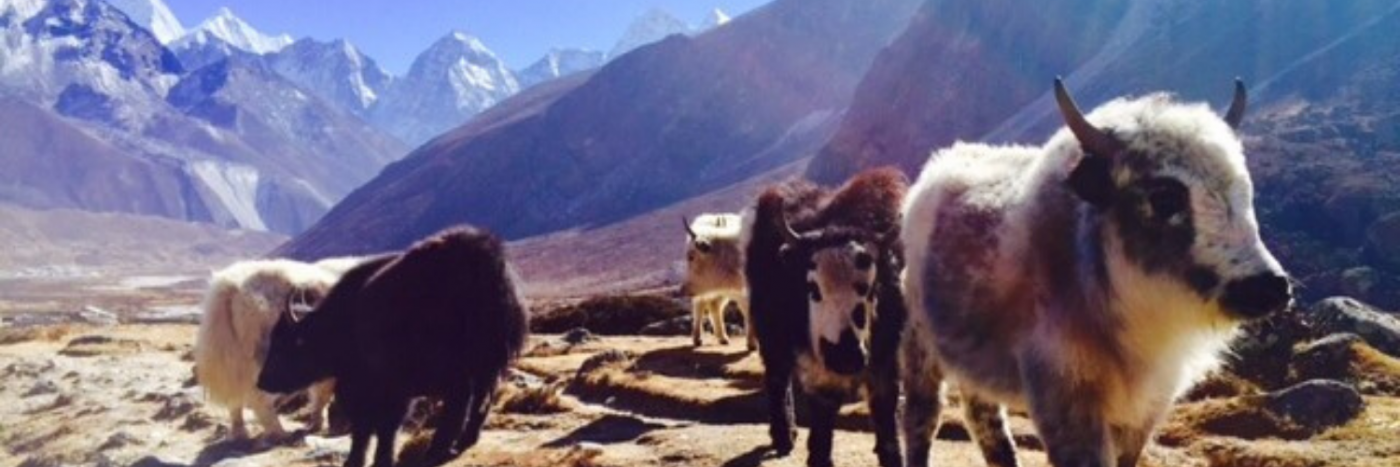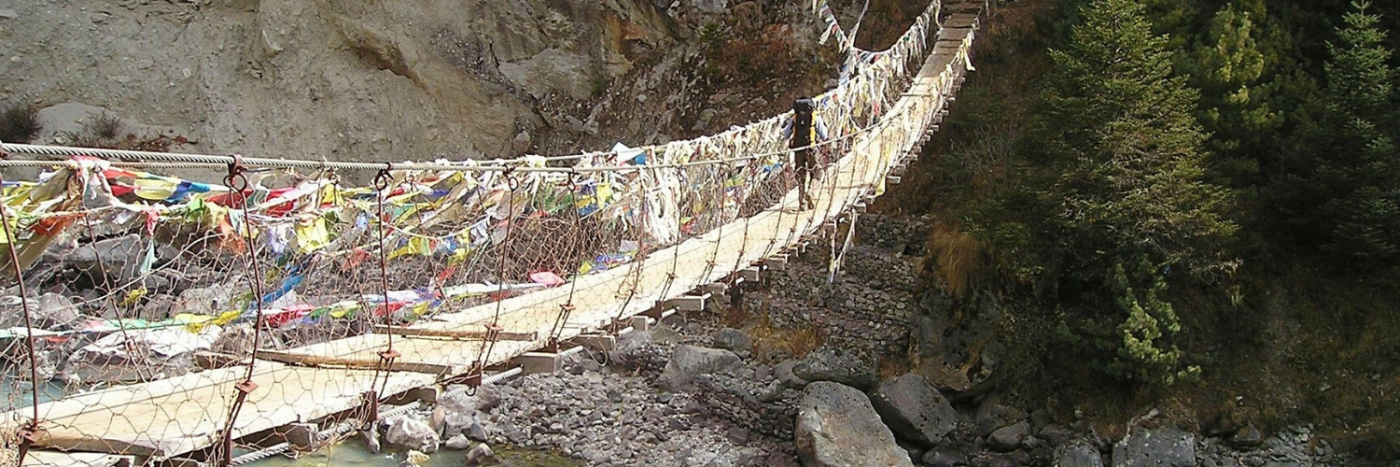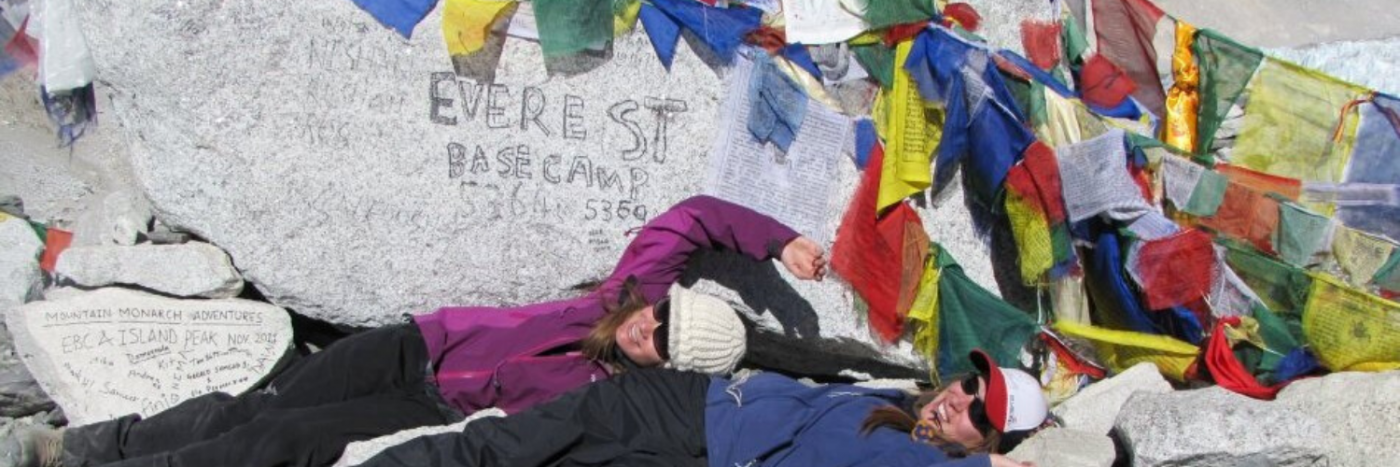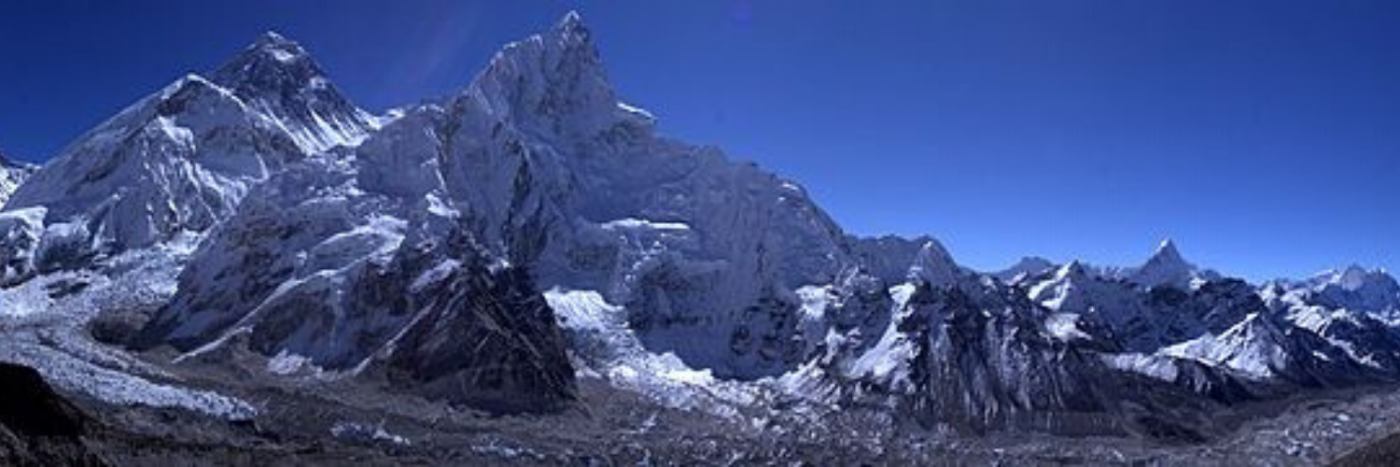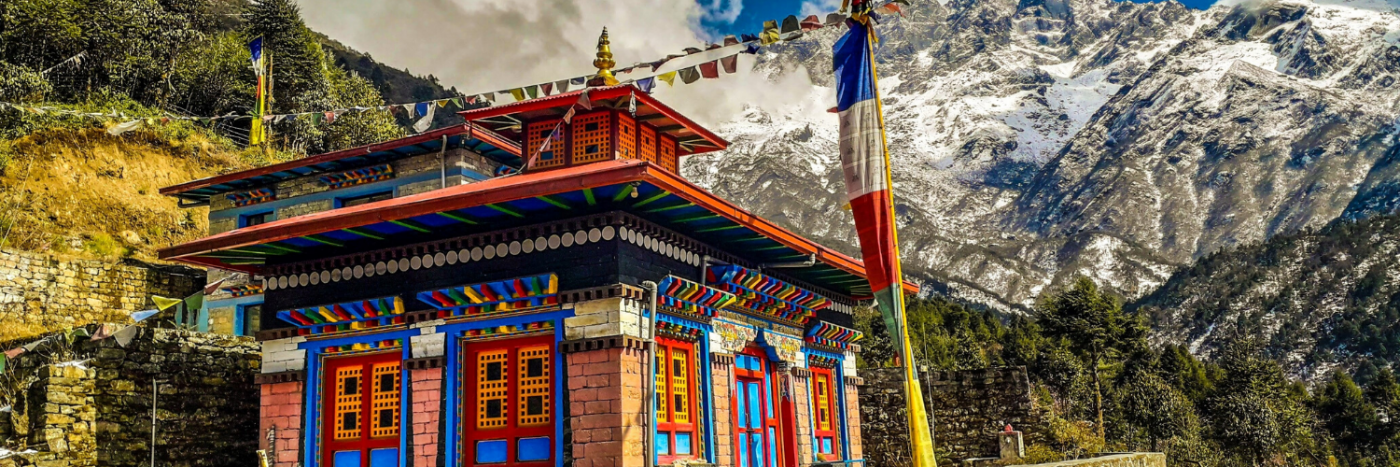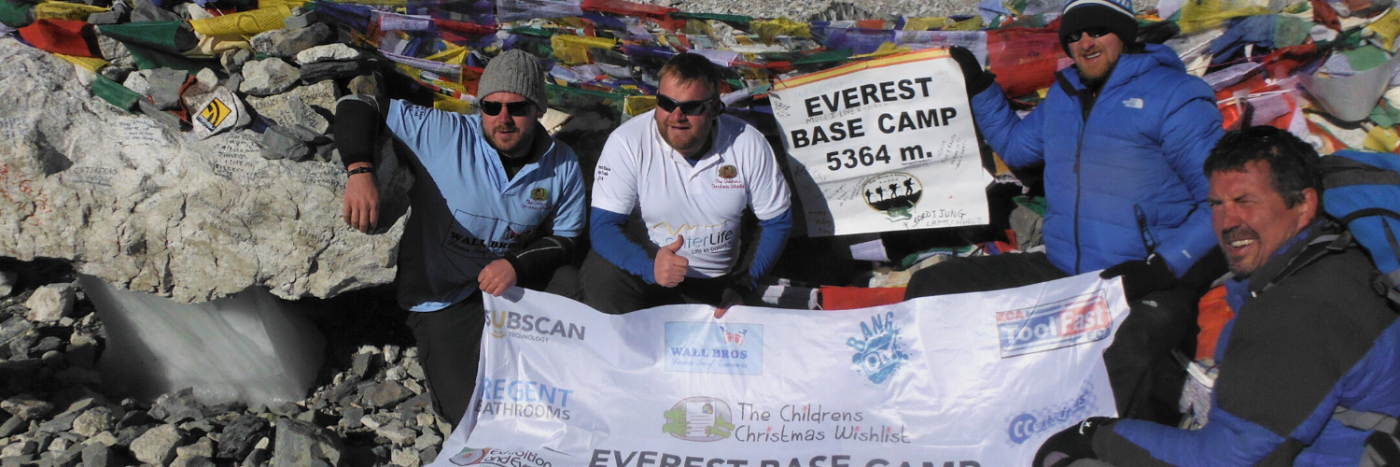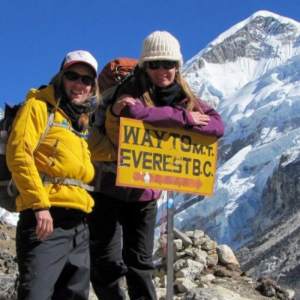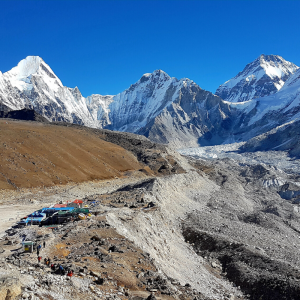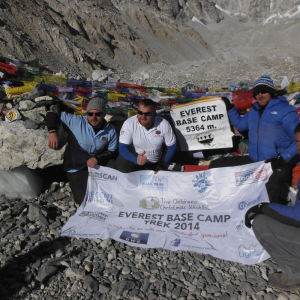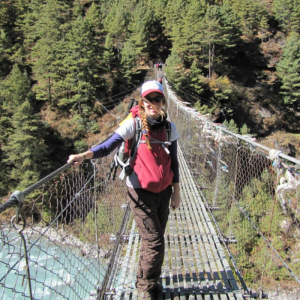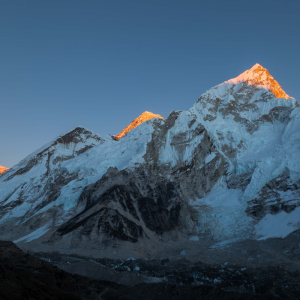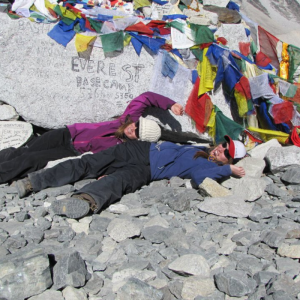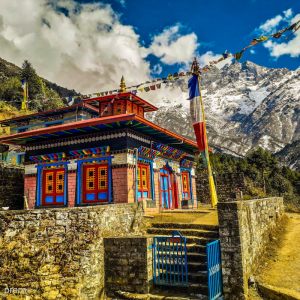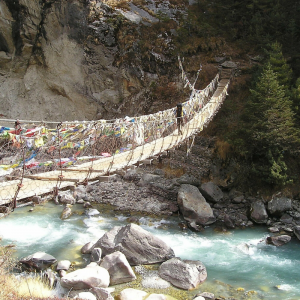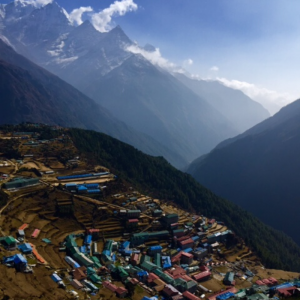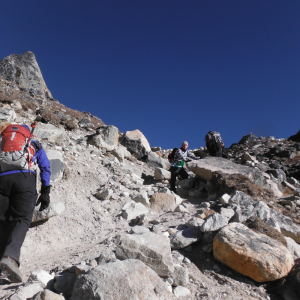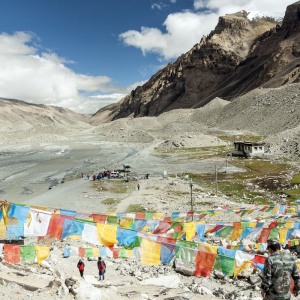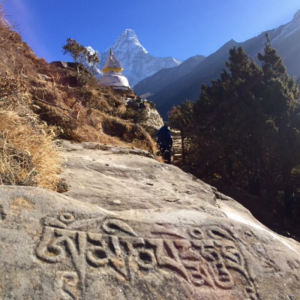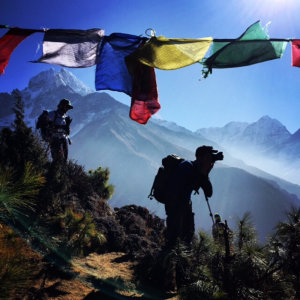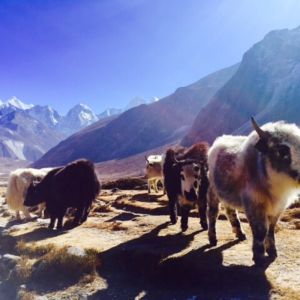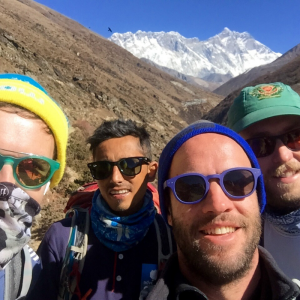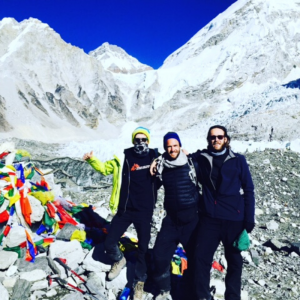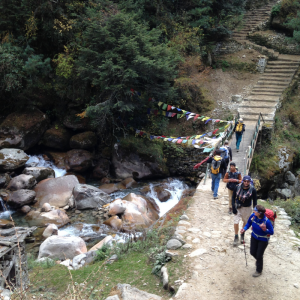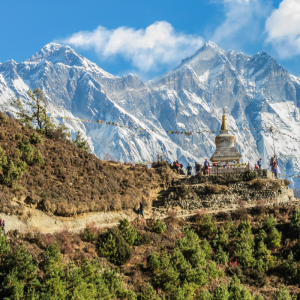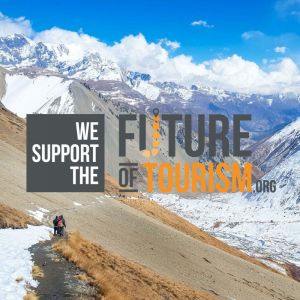- Overview
- Map & Itinerary
- Essential Info
- Pics & Vids
- Dates & Prices
Highlights
- Follow in the footsteps of famous climbing parties and trek to Everest Base Camp
- Explore Namche Bazaar and soak up the Sherpa culture
- Walk amidst the world’s highest mountain range, with incredible views of Everest, Nuptse, Lhotse and Ama Dablam
- Visit the hilltop monastery at Tengboche, the largest gompa in the Khumbu region
- Ascend Kala Pattar for awe-inspiring views of Mt Everest
- Experience the warmth and hospitality of the Sherpa people
- Extra acclimatisation days built in for a properly paced trek and to maximise success
- Private trips available for groups over 6 people
- FREE Adventurous Ewe Water-To-Go Bottle when you join this trek to reduce our plastic footprint in Nepal.
Overview
Experiencing the Nepalese Himalayas and its local people is a mountain adventure with treasured encounters and experiences that you will value for many years to come! Eight of the world’s fourteen highest peaks are found in the Everest region, setting the stage for a journey of a lifetime. Trekking to the most iconic base camp at the foot of the greatest mountain in the world, Mount Everest (8848m), this is one of the world’s most classic treks.
Following the legendary ‘Everest Trail’ through Sherpa country past cultivated fields and small villages This carefully crafted itinerary together with trekking at a measured pace, will greatly assist you with your acclimatisation. Reaching spectacular high altitude scenery including the incredible monastery at Thyangboche, views of Ama Dablam, Everest and other mighty Himalayan peaks makes this challenging trek so special. As well as reaching Everest Base Camp, you’ll have the opportunity to climb Kala Pattar (5545m). Kala Patter offers magnificent views of Mt Everest at sunrise together with breath-taking mountain scenery of the Khumbu.
This trek also gives a great insight into the lives and culture of the Sherpa people. You will be accompanied by our amazing team of local guides and crew, some of whom are traditional Sherpas from the Everest region. Plus, our commitment to the rights and fair treatment of porters and trekking guides and our support of the environmental charity, Cool Earth, means you can rest assured knowing you’re doing the trek of a lifetime the ethical and meaningful way.
Flights
Flights are not included in your Everest Base Camp adventure giving you the flexibility to depart from the airport of your choice and extend your stay Nepal if you wish.
We will provide you with the recommended flights for this trip in order for you to take up the airport transfers included in Nepal. Alternately, you can book your flights through our flight agent who is ATOL & ABTA protected.
Arrive and pre-trek briefing
A warm Nepalese greeting is awaiting you on your arrival at Kathmandu Airport where you will be transferred to your hotel in Thamel.
Your Local Guide will also provide you with a comprehensive trek briefing so you’re all set for your exciting mountain adventure ahead.
Included
Transfer: For designated flight arrival time. You will be met at the airport and transferred to your hotel in Thamel, Kathmandu. For those of you who are not on or near this flight, you will simply catch a taxi to the hotel.
Tour: Kathmandu tour with local guide
Accommodation: Hotel (twin share basis)
Meals: Not included
Morning tour of Kathmandu. Afternoon transfer to Mulkot
The day starts with a visit to one of the holiest temples for Hindus all around the world – Pashupatinath. Your local guide will take you through the spiritual journey with an engrossing explanation about the Hindu religion, the cycle of birth and death and the story behind the Sadhus – Hindu Holy Men, who renounce their social life to devote their life to Shiva (Hindu God of Destruction) to whom the temple is dedicated. Spiritually stimulated, you’ll travel a short distance (15min approx) to reach the largest Buddhist stupa in Nepal (disputably, in the world) – Bodhnath. Follow the pilgrims circumambulating the stupa spinning the prayer wheels. Offer your prayers to Lord Buddha lighting a traditional butter lamp at the main entry way to the stupa. Lunch at a roof-top restaurant commanding an enticing view of the stupa.
After lunch, drive south-west out of Kathmandu for approx 85 kms to Sun Koshi valley for a night in Taj River-view Resort located near to Sun Koshi river in the village of Mulkot along Banepa-Sindhuli-Bardibas highway. Transfer to Mulkot (3.5 – 4 hrs approx).
Included
Transfer: Private transfer
Accommodation: Taj Riverside Resort or similar (twin share basis)
Meals: Breakfast & dinner
Spectacular flight to Lukla (2800m); trek to Phakding (2,652m)
Following breakfast you will be transferred to Manthali Airport (1 – 1.5 hr approx) for your flight to Lukla (approx. 20 mins). During the flight if the weather is good, the views of the Himalayas from the small plane are amazing as you enter the gateway to the
region of the legendary Sherpas.
Landing on the mountain airstrip of Lukla (2,800m), your trek begins heading northwards up the valley of the Dudh Kosi (or ‘milk river’). The route then descends from the small plateau, down into the forested valley. Heading north towards Phakding – meandering trails lined with stoned walls. Lunch en route in a picturesque Thado-Koshi on the high rise above the river of the same name and with imposing sister peaks of Kusum-Kangarru in the backdrop. The trail offers some tantalising views before reaching the small settlement of Phakding (2,800m), where you will spend your first night in a basic teahouse.
Trek details
Trek length: approx. 9kms
Trek time: approx. 3 hours
Total ascent: 190m
Included
Transfer: Airport transfer
Accommodation: Teahouse at 2800m
Meals: Breakfast, lunch & dinner
Trek from Phakding to Namche Bazaar (o/n at 3440m), with time to explore the Sherpa villages
Heading out of Phakding your route follows the Dudh Kosi northwards. Today’s walk takes you through magnificent forests with glimpses of the mountains ahead. Crossing the river several times by bridges you will pass through the villages of Benkar, Monzo and Jorsale. A final bridge spanning the narrow gorge of the river Dudh Koshi brings you to the foot of the steep climb to Namche. Halfway up this ascent, you may get your first glimpse, cloud-permitting, of the summit of Everest appearing majestically behind the great ridge of Nuptse-Lhotse. A last 300m of climbing brings you to Namche Bazaar, the Sherpa capital and the main town in the area. At an elevation of 3450m above the sea level, Namche Bazaar is the largest village in the Everest region often
called the ‘Sherpa Capital’ of Khumbu and is an important trading centre. It has a weekly market on Friday afternoon and Saturday mornings but the town bustle and buzz all day every day with trekkers, coffee shops, bakeries and stores selling all kinds of trekking and climbing gear as well as Tibetan artifacts.
Trek details
Trek length: approx. 11kms
Trek time: approx. 6 hours
Total ascent: 830m
Included
Accommodation: Teahouse at 3440m
Meals: Breakfast, lunch & dinner
Acclimatisation day Namche Bazaar to Khumjung (3780m)
Namche Bazaar is tucked away between two ridges amongst the giant peaks of the Khumbu. An ancient marketplace where goods from as far away as Tibet are still are traded. Namche is a great place to spend an acclimatisation day before trekking higher with its abundance of cafes, bars and souvenir shops. Today will see you take an acclimatisation walk, whether this involves going as high as the village of Khumjung (3780m) above Namche, or to the Everest View Hotel. Either of these options provides superb views of Ama Dablam, Nuptse, Lhotse and Everest. You will then spend a second night at your teahouse in Namche Bazaar.
Trek details
Trek length: approx. 9kms
Trek time: approx. 4 hours
Total ascent: 380m
Included
Accommodation: Teahouse at 3440m
Meals: Breakfast, lunch & dinner
Trek Namche Bazaar to Tengboche (o/n at 3860m)
Today’s trail is spectacular in terms of scenery. The main route out of Namche heads north-west climbing steeply out of the town to a ridge crest where a spectacular view of Everest, Lhotse and Ama Dablam is revealed. The trail then follows a contour high above the river with occasional short climbs as you cross a series of ridges. Towards the end of this contour trail is the tiny settlement of Kangjuma where various items of local art and craft are laid out to entice passing trekkers.
From Kangjuma the trail descends to a bridge across the Imja River at Phunki. Beyond the river, you’ll climb a long ridge to Tengboche (3860m) the halfway point of your trek and the location of one of Nepal’s finest monasteries. Tengboche Monastery, also known as Dawa Choling Gompa, is a Tibetan Buddhist monastery of the Sherpa community. Situated at 3,867 metres, the monastery is the largest gompa in the Khumbu region of which you’ll have the chance to visit.
The sunset and sunrise on the fantastic panorama of mountains surrounding us are not to be missed – Everest, Nuptse, Lhotse and Ama Dablam provide a wonderful backdrop to your teahouse. Look out for Himalayan Tahr in the forest surrounding the monastery.
In the evening, you can visit the much-revered monastery for an interaction with the
resident monks and to attend a prayer session and get the blessing from a monk, as do all the climbers on the Everest expeditions.
Trek details
Trek length: approx. 11kms
Trek time: approx. 6 – 7 hours
Total ascent: 420m
Included
Accommodation: Teahouse at 3860m
Meals: Breakfast, lunch & dinner
Trek Tengboche to Dingboche (o/n at 4400m)
Today will see you descend through the forest to Devoche before crossing the rushing Imja Khola, whose valley the route will then follow. Climbing steadily, the trail enters Pangboche, at 3900m, the highest and the last settlement that is inhabited all year round. Ascending the valley, you will have lunch at Shomore, after which you will leave the trees behind and cross a wooden bridge at the confluence of the Khumbu and Imja Kholas. A short steep climb brings you to Dingboche, at 4400m, a summer settlement where you will be surrounded by towering peaks.
Trek details
Trek length: approx. 12kms
Trek time: approx. 6 hours
Total ascent: 480m
Included
Accommodation: Teahouse at 4400m
Meals: Breakfast, lunch & dinner
Acclimatisation day in Dingboche to Chukkung (4730m)
In accordance with our careful program of acclimatisation you will spend 2 nights at this altitude before moving further up the Khumbu Valley. To assist with your acclimatisation you will have a day hike to Chukkung (4730m) in the upper part of the Imja Valley and directly below the tremendous 3000 metre south face of Lhotse. This is a high and wild corner of the Khumbu, the views here of ice flutings and soaring, serrated mountain ridges are incredible. After a most scenic lunch stop, you will retrace your steps to Dingboche to spend a second night in your teahouse. There are fantastic views towards Tibet and of Island Peak and Ama Dablam.
Trek details
Trek length: approx. 10kms
Trek time: approx. 5 hours
Total ascent: 380m
Included
Accommodation: Teahouse at 4400m
Meals: Breakfast, lunch & dinner
Trek from Dingboche to Lobuje (4,910m)
The trail climbs steeply out of Dingboche past a chorten and ascends the valley gradually to Dugla at the end of the terminal moraine of the Khumbu Glacier. A steep climb to Chukpo Lari, a striking yet poignant place with a cluster of memorials in tribute to the climbers who have died on Everest together with panoramic views of the peaks lying on the Nepal-Tibet border. The trail then eases off as you follow the valley to Lobuje, a tiny hamlet with a few teahouses occupying a rocky, streamside location surrounded by towering peaks including Pumori (7161m), Nuptse (7861m) and Lhotse (8516m). The sunset over Nuptse is something not to be missed.
Trek details
Trek length: approx. 12.1kms
Trek time: approx. 6 hours
Included
Accommodation: Teahouse at 4910m
Meals: Breakfast, lunch & dinner
Trek Everest Base Camp (5364m) and Gorakshep (5080m)
Today is a long day as you leave very early and follow the Khumbu Glacier northwards to Gorakshep (5,184m). The trail undulates up and down the moraine with some short steep sections. The path is rocky as you are now on the lateral moraine of the Khumbu Glacier. It will take approximately 3 hours to reach Gorakshep teahouse where you can unload your bags, restock your snacks and water to then make your final approach to Everest Base Camp. The trail ascends the side of the glacier for a couple of hours before finally descending onto the rocky glacial moraine itself. The route winds through fascinating ice seracs to the area known as Everest Base Camp. From Base Camp (5364m) you will have close up views of the Khumbu Ice Fall where you can appreciate just how difficult it is for the climbers to negotiate a route through this area on their Everest ascent. Here Nuptse towers above and Pumori rears up behind and you are left in awe of this incredible location. After the obligatory photo stop at Base Camp you will retrace your steps back to Gorakshep.
Trek details
Trek time: approx. 9 hours
Total ascent: 274m
Included
Accommodation: Teahouse at 5080m
Meals: Breakfast, lunch & dinner
Trek Gorakshep to Pheriche (4280m) via Kalapathar (5,545m)
Today sees another tough challenge with a non-technical yet steep climb above Gorakshep to the small prominent peak of Kalapathar, ‘Black Rock’, at 5545m in the early hours of the morning. From this lofty perch you will witness the grandeur of Everest up close with epic summit views of the world’s highest mountain and the neighbouring peaks of Nuptse, Lhotse and Ama Dablam.
Returning to Gorakshep (1.5hr approx) you’ll then proceed with the return journey to Phericheto and the lower altitude of Pheriche.
Please note, the walk to Everest Base Camp and the climb of Kalapathar are both very tough. We may change the order in which we tackle these sections depending on the group’s ability and weather conditions.
Trek details
Trek time: approx. 8 – 9 hours
Total ascent: 361m
Total descent: 1305m (trekking)
Included
Accommodation: Teahouse at 4280m
Meals: Breakfast, lunch & dinner
Trek from Pheriche to Tengboche (3860m)
Your trail cuts its way down the hillside blanketed with beautiful rhododendron forest and juniper trees. With spectacular bridge crossings your route follows the Dudh Koshi gorge descending through pine forests where you can often see mountain goats. The trail presents you with more incredible views of Ama Dablam, Thamserku and Nuptse mountains. With a crossing of another suspension bridge over the Imja Khola River, you’ll then arrive in the small village of Tengboche where you can visit their renowned monastery and Sherpa Heritage Foundation museum. Again you will have more striking views of Ama Dablam, lush green hills and the flowing Imja Khola river, a tributary of the Dudh Kosi.
Trek details
Trek time: approx. 4 hours
Total descent: 380m
Included
Accommodation: Teahouse at 3860m
Meals: Breakfast, lunch & dinner
Trek from Tengboche to Monjo (2840m) via Namche Bazaar
The trek to Namche Bazaar takes you along a beautiful undulating trail high above the Dudh Kosi. The Dudh Kosi is a storied yet “tame” river fed from the meltwater of Everest’s infamous Khumbu Icefall and flowing among the giants of the Himalaya. You will have some time in Namche to enjoy the one of the very welcomed coffee houses and bakeries and with its position situated on the slope of an arch-shaped mountain, absorb these incredible views of of giant Himalayan peaks. Leaving Namche Bazaar you will take the outward trail with a couple more bridge crossings you’ll exit Sagarmatha National Park and reach the small village of Monjo.
Trek details
Trek time: approx. 6 hours
Total descent: 1025m
Included
Accommodation: Teahouse at 2840m
Meals: Breakfast, lunch & dinner
Trek from Monjo to Lukla (2800m)
This is the final day of your Everest trekking experience. A your route gradually descends, the valley becomes more enclosed passing through a variety of settlements and forests. After a stop for lunch, you’ll continue on the river’s true left bank to Chopling (2660m) where you begin the final climb of the trip with a 45-minute steady ascent into Lukla. Arriving at this bustling mountain town denotes that it’s your last evening of the trek giving you the perfect time to celebrate a successful journey and say thanks to the team, especially the porters who will return to their villages from here.
Trek details
Trek time: approx. 6 hours
Total descent: 25m
Included
Accommodation: Lodge at 2800m
Meals: Breakfast, lunch & dinner
Spare day for poor weather/acclimatisation
Day in hand for poor weather contingency or additional acclimatisation day. This day will also come into play if your flight to/from Lukla is postponed due to adverse weather conditions.
Included
Accommodation: Teahouse
Meals: Breakfast, lunch & dinner
Return flight from Lukla to Kathmandu Airport and transfer to Kathmandu
Having completed one of the world’s most renowned mountain trails, it’s time to fly back Manthali (20 mins) with a stunning morning flight over forests and villages where you’ll then be transferred to your hotel in Kathmandu (5 – 6 hours). Arriving in the bustling city late-afternoon, there’s time to freshen up before heading into town to enjoy the particular delights of Thamel. This evening you’ll enjoy a celebratory meal and reflect on your Everest Base Camp adventure. Please note, dinner is at your own expense to allow you the freedom to order what you wish.
Included
Transfer: Airport transfer
Accommodation: Kathmandu Guesthouse or similar (twin room share)
Meals: Breakfast only
Free day in Kathmandu (or can also be used as a spare day for any poor weather conditions)
You can either relax in the hotel or nearby cafes and watch the world go by in Nepal’s vibrant capital city or you can explore the rich in artistic and cultural heritage of Kathmandu full of fascinating and eclectic sights. Visit the Swayambhunath – the Monkey Temple; take stroll to Durbar Square – home to the Kumari Devi – considered a living goddess; pull up a seat in a cafe and enjoy a cup of spicy hot chai and watch the world go by or stroll through the backstreets and Kathmandu’s timeless cultural and artistic heritage reveals itself in hidden temples overflowing with marigolds, courtyards full of drying chillies and rice, and tiny workshops. The day is yours.
Alternately, you can join an optional tour of the medieval town of Bhaktapur (additional cost applies).
Included
Accommodation: Hotel (twin share basis)
Meals: Breakfast only
Return flight from Kathmandu home
Filled with an immense sense of pride and achievement together with some fantastic new friendships and memories of a lifetime.
Included
Transfer: From Hotel to Kathmandu Airport at designated time for nominated group flight
Meals: Breakfast only
Meals: Breakfast only
There is also an option to have a charted helicopter flight from Pheriche to Lukla to reduce the itinerary by 2 days. Please get in touch with us for more info at info@adventurousewe.co.uk.
Please note, this itinerary is subject to minor changes depending on flight times, weather (particularly with flying in and out of Lukla), the ability of the group, etc., however this outline provides an excellent indication of the trek and what you will experience. As with any trek in mountainous areas, safety is paramount and your Leader will always make decisions to amend the itineraries to ensure the safety of the whole group.
Optional extensions are available at an additional cost:
- Chitwan Safari
- Kathmandu to Delhi
- Ancient Varanasi & the Ganges
- Ancient City of Lhasa
Exclusively curated itinerary by Adventurous Ewe
Since the COVID-19 pandemic hit the tourism industry which employs 1 in 10 people worldwide, we’re keen to promote sustainable adventures to help support local communities and give you the chance to have a more meaningful travel experience.
The Everest Base Camp Trek has been designed to deliver an amazing experience and showcase the some of the most stunning landscapes across Nepal whilst also giving you the chance to step out of your comfort zone and gain a greater understanding of the mountains, the local environment, local communities and the culture.
We’ve crunched the numbers to work out the total carbon footprint of the Everest Base Camp Trek, and plant or protect enough trees to suck 2x as much back out the atmosphere.
What’s the number?
It works out on average at 499kg of CO2 emissions per person, including all local transport, accommodation, food, activities, leaders, crew and office operations.
The only thing not included is travel to Nepal. Given that our beloved guests travel from all parts of the UK for this adventure we have no way of reliably knowing their travel plans therefore we’re unable to include an individual number in the figure on display here.
What does the number mean?
To give you a snapshot of the numbers:
- Driving 1000miles/1609km would be approx. 281kg of CO2 in an average car (or 140.5kg per person if there was 2 of you).
- A return economy class flight London – New York would be approx. 1,619kg (1.66 tonnes) per person.
- 10 trees in a temperate forest are estimated to remove approx. 250kg of CO2 from the air over a period of 5 – 10 years.
What are we doing about it?
Our adventures are relatively low-carbon by design, and we’re working to develop long term carbon reduction plan. Following much research into climate change organisations, we carefully selected to support the environmental charity, Cool Earth. They’re a sustainable operation and work with rainforest communities across the globe to halt deforestation and it’s impact on climate change. We invest 1% of our revenue into supporting critical conservation projects world-wild with Cool Earth.
On a local level here in the UK, we’re an ongoing business member of the Snowdonia Society, plus Jim and Sue, together with some of our local leaders, also help the Society with their local projects such as planting native trees in Snowdonia. This is to help preserve the landscape and enhance wildlife habitat here in Snowdonia.
Want to know more?
We believe that with great travel, comes even greater responsibility. Tourism is one of the most important and largest industries on the planet. It employs more people worldwide than any other, with millions of families relying on tourism for their daily needs. At Adventurous Ewe we believe that our type of small scale, positive impact tourism can bring benefits to many communities, help preserve the environments we travel to see, and provide real and positive social exchanges. Here is our plan to do our part towards helping reduce factors that we can contributing to climate change as part of Tourism Declares a Climate Emergency.
We’ve joined the movement to reshape the Future of Tourism!
We are excited to announce that Adventurous Ewe has signed the new set of Guiding Principles launched by the Future of Tourism Coalition. As a signatory, we commit to place destination needs at the centre of our recovery strategies and do our part to build a better tomorrow for travel and tourism.
These transformative principles outline a bold vision for the future of tourism – one that retains the integrity of destinations, promotes inclusivity and equality, maximizes positive impacts for communities and environments, and fosters collaborative change.
As a collective, we can build a better future for all and we’re super excited to do our part.
Learn more at Future of Tourism
#FutureofTourism
As well as carefully crafting amazing and meaningful adventures across the planet, we’ve made booking them as flexible, safe and as simple as possible. For more info, please our Book and Travel with Confidence page.
Adventurous Ewe Financial Guarantee
Any monies paid to Adventurous Ewe for a trip are immediately placed into a Trust account and not used for the day-to-day operations of the company. So, in the unlikely event of our insolvency, money paid in respect of future travel will be refunded, in full. This pledge has been honoured since the foundation of Adventurous Ewe in 2007. No client has suffered financial loss outside our T&C’s whilst travelling with us.
Financial security
Rest assured, your money is safe in any and all circumstances. There has been and always will be full financial protection on your booking. If your adventure needs to be cancelled for any reason, like say a global pandemic, you won’t be left stuck and you’ll be offered plenty of alternative options thanks to our financial protection through IPP (International Passenger Protection). What’s more, in the very unlikely event of Adventurous Ewe going under, you’ll get your money back and be repatriated if you were on a trip at the time.
On joining us for the Everest Base Camp Trek, you will receive all the exciting trip info via our mobile travel app.
You’ll have access to your itinerary, trip countdown, live updates, contact info, weather forecasts, know before you go trip info, kit lists and much more at the touch of a button 24 hours a day via your mobile phone. No more unnecessary use of reams of paper to benefit the environment and the need of carrying around documents with you. A’ppy days.
With being a small family business we pride ourselves with providing personal, professional and friendly service. We appreciate that everyone has different levels of experience and reasons for wishing to embark on this Everest Base Camp Trek and therefore require varying levels of support and guidance. We’re here to help you every step of the way from the moment you join the flock all the way through to completing the challenge and beyond. Jim and Sue’s knowledge and expertise stems from dozens of years of travelling and exploring the destinations that we visit in order to fully support you in the lead up to your adventure. They have both completed this classic mountain journey numerous times and are best place to help you with any questions, no matter how big or small.
International flights
Overnight flight from UK to Kathmandu, Nepal
On signing up for the trip, we will provide you with the recommended flights to book or alternately, we can book the flights for you through our ATOL and ABTA protected Flight Agent at an additional cost.
Flights are not included in your package to give you the flexibility to travel from your nearest airport, use your frequent flyer points or extend your stay in Nepal if you wish. The recommended flights for this will include airport transfers in Nepal.
Internal flights in Nepal
Access to the high and remote areas of the Himalaya where the Everest Base Camp Trek starts is often only possible using internal flights. The changeable nature of mountain weather makes flying conditions complex between Kathmandu and Lukla Airports. In addition, the Civil Aviation Authority of Nepal does not operate to the same standards as those of western nations and all airlines in Nepal appear on the European Commission’s list of airlines that are banned from flying into EU member states. Flying in Nepal is an acknowledged risk, and the UK Foreign and Commonwealth Office travel advice provides further info.
Adventurous Ewe is mindful of its duty of care to you travelling with us in Nepal. There was an independent air audit of Nepal airlines undertaken by UK tour operators during 2017. From this Adventurous Ewe uses only four airlines in Nepal which were approved by this audit as safe carriers. These airlines are: Yeti Airlines, Tara Air, Buddha Air and Summit Air. In addition to this both Tara Air and Yeti Airlines have fulfilled the IATA Standard Safety Assessment (ISSA) – a global safety standard for commercial airlines operating smaller aircraft which you can learn more about by visiting: www.iata.org/whatwedo/safety/audit/issa/Pages/index.aspx.
We continue to cooperate with other tour operators to monitor aviation safety in Nepal. While we have taken appropriate action to try to minimise the risks of flying in Nepal, you should be aware that flying in mountainous terrain is not without any risk. Please note that poor weather can cause delays on internal flights. If at the start of your trip internal flights are cancelled for the day, you will spend an extra night near the airport and this may be at a hotel other than the group hotel. On the majority of trips there is enough flexibility in the trekking itinerary to make up 1 or possibly 2 lost days, but an alternative trek will be provided if internal flights are cancelled for a subsequent day. Helicopters can sometimes fly when the scheduled fixed wing aircraft cannot. If your group is offered the opportunity to use a chartered helicopter to reach the start point of the trek, the cost will be shared between those choosing to take this option.
Given the EBC trek finishes with a return internal flight out of the mountains with currently no alternative road access, we have included 1 nights in Kathmandu as a contingency against delay. Should helicopters be able to fly during a period when fixed wings are cancelled, we will consider using these on a case by case basis to enable you to meet your international flights. In the extremely unlikely event that flight cancellations cause you to miss your homeward international flight, you will be responsible for re-booking your onward travel and for any associated costs. We advise you to take out suitable insurance and to keep your receipts, as you may subsequently be able to make a claim.
All nationalities require a full passport that must be valid for 6 months beyond the intended length of stay. For the most up to date info, please visit the Foreign & Commonwealth Office website.
Most nationalities require a visa for Nepal, and we highly recommend that you secure your visa prior to travel to avoid any lengthy queues or unnecessary hassles. Applications can be made directly through the Nepal Embassy (by post or in person) by visiting https://uk.nepalembassy.gov.np/visa/. All Nepal tourist visas are multiple entry. The current cost for a visa in advance is GB£25 for a 15-day visa, GB£40 for a 30-day visa or GB£90 for a 100-day visa for UK passport holders (plus postage fees if applying by post).
On arrival in the immigration hall at Kathmandu there are 3 queues and if you have obtained your visa in advance you can go straight to (3) – immigration.
If you were unable to obtain your tourist visa in advance, you can avoid the queue for the first stage of the visa process on arrival at Kathmandu Airport by printing off the application form found online. Please complete this form before you travel and attach one passport sized photo. If you travel with this form you can then go directly to the cashier to pay for your visa.
Also, please visit the UK Foreign & Commonwealth Office website, or your respective nationality governing website, for the latest travel information on Nepal.
Travel Insurance
Travel Insurance is an important part of any booking. It is compulsory that everyone who travels with us has taken out adequate travel insurance which includes, among other things, cover for the full value of your trip, medical (emergency, evacuation and repatriation) arrangements, activities undertaken, personal liability, cancellation, curtailment and loss of luggage and personal effects and COVID-19 travel cover.
For UK residents we have partnered with Campbell & Irvine Direct to provide you with a travel insurance. If you would like to obtain cover for your trip please feel free to contact specialist Insurance Brokers, Campbell Irvine Direct for a quote.
You must send your Travel Insurance Policy to Adventurous Ewe no less than 8 weeks prior to departure.
Global Rescue Membership
For peace of mind whilst trekking in the mountains, Global Rescue provides short term membership giving access to travel, security, medical advisory and evacuation services up to $US500,000. They’re a specialised field rescue company, and assist from the point of illness or injury by getting you to the closest and most appropriate medical facilities to get stabilised. Once fit to fly if you require additional inpatient treatment Global Rescue will further evacuate and repatriate to your home hospital on record. These services are all covered through their upfront membership fee with no claims process. For more info, please click here.
For the most up to date info on vaccinations, please consult with your GP or travel healthcare practitioner 8 weeks in advance of travel. There are no mandatory vaccination requirements. Recommended vaccinations are: Polio, Tetanus, Diphtheria, Typhoid, Hepatitis A. For up to date vaccination information please check the NHS government website ‘Fit for Travel’.
There is low to no risk of malaria throughout Nepal and antimalarial tablets are not usually advised although may be considered for certain higher risk groups; you may wish to consult your GP or travel health clinic for further advice. The risk is highest in the low lying southern ‘terai’ districts bordering India.
A yellow fever certificate is only required if travelling from a country with risk of yellow fever transmission or for travellers having transited for more than 12 hours through a country with risk of transmission.
Dengue fever is a known risk in Nepal. It is a tropical viral disease spread by mosquitoes. There is currently no vaccine or prophylaxis available for Dengue, and therefore the best form of prevention is to avoid being bitten. As of August 2019, there has been a recent outbreak of Dengue fever in southeast Nepal and we therefore recommend you take extra precautions to avoid mosquito bites (such as wearing full length trousers, long sleeves and applying insect repellent during the day as well as at dawn and dusk).
The Everest Base Camp trek travels at high altitudes where there is a risk of being affected by Acute Mountain Sickness. Our itinerary is designed to enable you to acclimatise to these altitudes, but you should be aware that it is still possible for you to be affected.
Rest assured we are monitoring and activating the guidelines and recommendations put in place by the respective governments and World Health Organisation as a result of COVID-19. You will receive our operational guidelines for this expedition when you join the trip and hand sanitiser and face masks will be provided for travel. Rest assured your safety and wellbeing is our top priority at all times.
Severe allergies
If you have a severe allergy please inform us at the time of booking. We will do all we can to help, but unfortunately we are unable to guarantee an allergy free environment on this trip. You will need to carry your own treatment for the allergy with you, as ‘adrenaline auto-injectors’ are not carried as standard by AE leaders and crew. Whilst your leader is aware of our trekkers medical history, please also inform your leader on arrival of your allergy, and let them know where you keep your adrenaline pen.
Adventurous Ewe puts the safety and well-being of you, our leaders & crew and the communities we visit at the centre of all our operations, always. Your safety and well-being is our top priority. The Everest Base Camp Trek is intentionally challenging and requires individual preparation as the trip is designed to take you out of your every-day comfort zone and achieve something extraordinary. Rest assured we have a thorough Safety Management System, indepth risk assessments and risk management systems in place.
You will be accompanied by local qualified Mountain Guide/s and a UK High Altitude Mountain Leader for groups over 8 people. All our Guides are Remote First Aid trained and have extensive experience in leading teams in this region. They will be ultimately responsible for your safety on this trip.
There will be radio or phone contact between Adventurous Ewe Mountain Leader, Local Leaders & crew and the Office Base in Kathmandu during your trek. Your Mountain Leader will also carry a Satellite phone for emergencies only and have 24-hour contact with Adventurous Ewe office in UK. In the unlikely event evacuation be required the National Park rescue service. All staff are highly trained with the evacuation procedures. A member of our staff will be carrying medical supplies should it be required.
If for any reason you need to leave the group early and come off the mountains, Sherpas will assist you with your descent and will arrange transfers, accommodation and medical care if necessary. All costs incurred due to an early descent will need to be covered by yourself before departing the hotel, this is why we insist on suitable travel insurance cover.
Many national governments provide a regularly updated advice service on safety issues involved with international travel. We recommend that you check the Foreign & Commonwealth Office Travel advice website for their latest travel information before departure and ensure that your travel insurance covers you for all areas your itinerary covers.
We also ask that you please ensure you use your alcohol-based hand sanitiser at all times to minimise the spread of any germs throughout your fellow flock of trekkers!
For more info, please visit our Safety and Well-being page.
Your UK Mountain Leader will have many years leading teams in Nepal and be an experienced high-altitude guide. Our Leaders are carefully selected to ensure you have the best experience on your trek and with a bit of humour thrown in for good measure. Your UK Mountain Leader will also have Remote First Aid qualifications as well.
Our Local Guides are very experienced, knowledgeable and have the renowed warmth and hospitality of the Sherpa people. They are constantly self-driven to go above and beyond to ensure you will have an amazing experience. Mountain climbing for the local guides is more than just a career, it’s a passion which they are proud to share with others.
Our Guides are responsible for ensuring the complete safety, well-being and enjoyment of the team whilst also retaining a flexible and supportive attitude. The Leaders/s have satellite phone, radio and mobile phone contact with base, the local office in Kathmandu and Adventurous Ewe’s HQ.
Porters welfare: We understand porters, and the whole mountain crew in general, are the heart and soul of our Base Camp treks and we believe that fair treatment of our crew on the mountain is not merely an industry requirement but the tenet of every Everest Base Camp expedition. Ensuring our crew is well paid, insured and cared for is a priority for us.
When we trek, the entire group ‑ you, the guides and porters alike ‑ are a team who share the same needs for safety and well-being in this mountain environment.
We pride ourselves in small group travel to minimise the impact on the environment, to maximise your safety and wellbeing and to make your experience more authentic.
The minimum group size for the Everest Base Camp Trek to run is 6 people and the maximum group size is 16 people.
You are most welcome to join this trek as a group of friends, family, colleagues, a private bubble or as a solo traveller. You are also welcome to use this trip as a fundraiser for the charity of your choice.
If you have a group of over 6 people, we would be more than happy to run a private trip for your team, your charity or your company. For any further info or to chat about running a bespoke trip, we’d love to hear from you at info@adventurousewe.co.uk or call 01492 588 069.
Trekking experience and level of difficulty – ‘Extreme’
This is a tough trek, reaching an altitude of 5,380m, but one that is very achievable with the correct preparations. It requires a reasonable level of strength, stamina, endurance and determination. Even if you consider yourself fit, you may still find the climb very challenging, depending on how well your body acclimatises to high altitude. There is no scientific way to determine how easily you acclimatise, and the acclimatisation process can also differ from climb to climb.
Having been operating Everest Base Camp treks for many years now, we strongly recommend this carefully planned itinerary due to maximising time for acclimatisation with built-in acclimatisation and contingency days together with experiencing the beautiful and varied scenery. You will be trekking high and sleeping low on some nights to help with acclimatisation as well.
The hiking on this trek is generally quite moderate and mostly on well-established trails. The trail crosses numerous modern suspension bridges over rivers and valleys; all have mesh sides and none are especially high, however, anyone with a strong fear of heights or vertigo may find them difficult. Please also be prepared for varied conditions and temperatures especially as you ascend. You are likely to be cold, washing facilities are minimal, the loos are different from the luxuries at home and your appetite may be affected by altitude. Sleeping proves more difficult as you ascend too. Though please remember that everyone on your trek will be experiencing the same and as a team pursuit, we encourage strong teamwork and support.
A bespoke training programme will be provided when join the team for this Everest Base Camp Trek to help you with your preparations. Your training should incorporate aerobic (endurance building), anaerobic (strength building) exercises and some good long walks! Training in your trekking kit with your ruck-sack on consecutive days in the outdoors is ideal to help with your preparations too.
We also have exclusive offers with our Training Partners and Communities – Her Spirit and the Bath Kettlebell Society. For more info, please visit our Training and Preparation page.
The more you are prepared, the more you will enjoy the challenge.
Our motto is: Train hard, smile harder and enjoy the journey!
When you ascend above 2500 metres your body has to acclimatise to the decreasing amount of the oxygen available. To allow your body to adjust we have structured this trek so that you ascend slowly, allowing acclimatisation to occur. However, during the acclimatisation process, you may experience some of the following symptoms – headaches, tiredness, disturbed sleep, shortness of breath, cough, loss of appetite, nausea, palpitations and swelling of the hands and face.
Individuals acclimatise at different rates and we would expect the majority of the team to notice the effects of being at high altitude, and while most will only feel discomfort and headaches, it is not uncommon for a small number of people to need extra care which will be provided by our leaders and crew. During your pre-trek briefing, altitude sickness will be discussed in more detail and advice on how to best cope with it. The most important thing is not to fear it, but to respect it. Know the signs & symptoms of AMS (Acute Mountain Sickness), be aware of how it affects the body and report any illness to your leader straight away. Our leaders and crew are there to help and are fully experienced with high altitude conditions and all the scenarios that trekking at these altitudes bring. You’re in good hands.
In most cases, AMS can be avoided following these guidelines:
- Drink around 3-5 litres each day to achieve suitable hydration levels. Try and avoid tea & coffee and definitely no alcohol
- Walk slowly, even when in the teahouses
- Keep warm, especially at night
- Eat well, even when you don’t feel like eating
All our trips that spend time at High Altitude follow our standard altitude safety measures. A number of medical conditions or medications can also reduce your body’s ability to acclimatise, and thus will affect your performance at altitude and make you more susceptible to AMS. If you are worried about any pre-existing condition (e.g. heart problems), or unsure of your physical ability, you must seek medical advice prior to booking. There are a number of untested herbal remedies which claim to prevent mountain sickness. However, only one drug is currently known to have a useful role in preventing AMS and to be safe for this purpose: acetazolamide (Diamox). We recommend that you carry Diamox in your first aid kit for treks where you spend an extended period above 4000m. Diamox can only be obtained from a medical professional on prescription and it is important that you first consult your own doctor so that you know there are no contra indications with other medicines you may be taking and that you do not have an allergy to acetazolamide. Diamox commonly causes some minor side effects, such as tingling fingers and toes, or a metallic taste in the mouth, but more severe reactions are rare. If you intend to take Diamox, you must familiarise yourself with the appropriate dosage and regime prior to coming on this trip. We recommend trialling it first in the safety of your home environment prior to the trek.
Please note that while we endeavour to assist you with achieving your personal goals, however there may be times when your leader makes the decision to either delay or stop your ascent based on your medical conditions and AMS symptoms. Please respect this decision for it is for your own safety and welfare.
A Trek Training Programme will be provided when you join this event to help you with your preparations. We also have exclusive offers with our Training Partners and Communities – Her Spirit and Strength & Movement Coast, Peter Lant. For more info, please visit our Training & Preparation page.
The more you are prepared, the more you will enjoy the challenge.
Our motto is: Train hard, smile harder and enjoy the journey!
We have a variety of tailored training weekends available to ensure you’re fully prepared for your trekking adventure. These training weekends are the perfect way to help you gauge your fitness and training progress under the careful guidance of our experienced leaders. Plus the leaders will chat through your specific trip and also provide guidance and tips relating to clothing and equipment, health and well-being, packing, mountain huts, trekking skills (walking on different terrain/at altitude/using trekking poles), teamwork and much more to ensure you are fully prepared and ready for your adventure ahead.
We predominantly host our training weekends in Snowdonia given the wide variety of terrain available to practice and where Chief Ewe’s, Jim or Sue, can meet you too. It’s a great way for you to meet fellow members of the flock and ask any questions, no matter how big or small. We’re here to make sure you’re ready. For further info, please email info@adventurousewe.co.uk or call 01492 588 069.
A full kit list will be provided when you register for this trip or you can download the Trip Notes for this trek. Good kit can make the difference between a fantastic adventure and an uncomfortable one.
An exclusive Adventurous Ewe discount code will be provided for the independent outdoor retailers both online and in store when booked on this expedition.
To help you get the very best from your Everest Base Camp Trek we will provide you with an exclusive Adventurous Ewe discount code to use in independent outdoor retailers both online and in store. They offer a large choice of kit that the staff themselves use while climbing, hiking, mountaineering, running, travelling or enjoying expeditions across the globe and they pride themselves on sharing their experience and knowledge of equipment so you can choose the right gear to suit you and this mountain trek.
The main trekking season in Nepal is from October to mid-May when daytime temperatures at most altitudes are generally comfortable for trekking, the sky is predominantly clear and rain & snow occur occasionally. Daytime temperatures will vary from 15ºC to 35ºC in the Kathmandu Valley to around 10ºC at 3,600m and progressively lower the higher you trek.
Different seasons offer different advantages for trekking.
Post Monsoon/autumn: Mid-September to November.
This is the main trekking season in Nepal. Day temperatures in Kathmandu are approximately above 20ºC. Skies are usually clear and days on trek are sunny and mild with clear mountain views. Nights will be colder with temperatures dropping as low as to minus 10ºC at the highest altitudes.
Winter: December to end February.
Despite the cooler conditions this is an ideal time to trek in Nepal. Skies are usually very clear especially in December and the mountain views are at their best. Nights will be very cold with temperatures down to minus 15ºC to minus 20ºC at the highest altitudes but days are pleasant and sunny. The trails are also much less busy at this time of year. In Kathmandu maximum daytime temperatures are 19ºC.
Pre-monsoon/spring: March to May.
Both day and night temperatures will be warmer in general but often a haze will build up in the afternoons. It is very hot in the lowlands and temperatures rise to 35ºC in Kathmandu. Flowers bloom in this season and this is one of the reasons people chose to trek in Spring.
Snow can be expected on any departure, usually at the higher altitudes.
Please remember that in any mountain area the weather is never predictable. You should be prepared and equipped to deal with any differences in weather beyond the conditions described above.
We recommend that you check the mountain weather forecast in the days leading up to your trek by clicking here.
16 nights: Hotel (4 nights), teahouses (12 nights)
In Kathmandu we usually stay at the Kathmandu Guesthouse, a 3-star hotel located within the Thamel district and 18 minutes’ walk from Kathmandu Durbar Square, a royal palace complex. All rooms have ensuite facilities and there is a restaurant, a bar and an outdoor courtyard. There is complimentary Wi-Fi in the hotel lobby and Wi-Fi throughout.
The teahouses are basic but adequate; please be realistic about what to expect in the mountains. The hub of the teahouse is the dining room, which is generally a heated area via stoves and often attractively decorated. Most teahouses sell snacks and other essentials such as tissues, soap and toilet paper. Almost all lodges have electricity but it is not wholly reliable and lighting may not be bright enough to read by – a head torch is essential. Electrical charging facilities are generally available only in the dining room (charged at approx. Rs150-350 per hour per device). Many of the lodges use solar power so sometimes there is not enough electricity for charging.
You will usually stay in twin-share bedrooms throughout this trek. Beds with foam mattresses, bedsheets and a pillow are provided. Bedrooms are unheated and get cold at night so a sleeping bag is essential. Most teahouses have only one or two basic toilets and sometimes these are located outside the main lodge building. Toilets are usually Asian ’squat’ style; although many lodges have now installed ‘western style’ seated ones. Toilet paper is not provided so you should bring your own or buy it locally. Some lodges now have hot ‘showers’ (charged at approx. Rs250-500 per shower).
Standards of cleanliness vary especially in the peak trekking season and in winter when the water freezes at night. Please report any problems to your leader or the lodge and be vigilant in your personal hygiene regime at all times. As a general rule, the higher altitude you go to, the more basic the lodges and the more expensive food and services become.
For more info or to request a single room, please get in touch with us at info@adventurousewe.co.uk.
Internal road transfers
Airport transfers and transfers to and from the start and finish of the trekking point will be via private minibus. All minibuses are fitted with seat belts.
Roadworks and infrastructure projects can cause delays on major roads within cities and highways between destinations. Road travel can also be disrupted due to demonstrations and bandhs (strikes) without warning. Major roadworks are currently ongoing in and around Kathmandu. Delays, traffic, poor road conditions and dust are a reality of road travel in Nepal.
Breakfast is included throughout the trip. In the teahouses breakfast will comprise of a choice of bread (a slice of toast, chapatti or Tibetan bread), eggs, and a choice between either muesli or porridge. Hot tea/coffee will also be served. On specific days, there will not be a choice for breakfast and either a trekkers breakfast (egg, hash brown, baked beans and toast) or a pancake with jam/honey will be served – these options are not available in all teahouses.
Lunch will be taken at a teahouse enroute – sometimes one of your guides will go ahead with the group’s order to make it more efficient. Dinner will be in the same teahouse that you overnight in (this is custom in Nepal). Most meals are included in your trip however, please refer to the itinerary for more information.
Although most lodges have almost identical menus, they are reasonably extensive and offer a varied selection, ranging from traditional Nepalese dhal baht to pizza. Another popular snack is momos; a type of Nepalese dumpling. Although meat is available in the teahouses, we advise against eating it on trek.
If you wish to order additional dishes and/or snacks, you should budget accordingly. Boiled drinking water will be provided at breakfast, lunch and dinner. All the lodges and teahouses sell snacks, chocolate bars, soft drinks and beer.
Whilst the teahouses can cater for vegetarians, albeit sometimes with a more limited choice, if you have a gluten free diet or vegan, then we strongly recommend you bring some extra food and snacks with you to supplement the food on trek. Unfortunately there will be a limited variety available for you given the nature of the trip and being in Nepal, it can be very hard (and sometimes impossible) to cater for a wide range of dietary choices and you will have to supplement your diet with food/snacks from home. If you have specific dietary requirements please do get in touch and we can further discuss the options available to you.
Please note that we are unable to provide separate menus and cannot accept liability for any problems arising from special dietary requirements or intolerances.
In Kathmandu your evening meals will be at the hotel and local restaurants.
Water
Staying hydrated is important when undertaking any physical activity but particularly so at altitude where it is generally recommended to drink at least 3-4 litres per person per day. We strongly encourage you not to buy bottled water on trek as this contributes to the growing problem of plastic pollution in Nepal.
The teahouses sell boiled water for approx. Rs150-300 per litre (the price increases the higher you trek) which should not require treating. This is also perfect for a bedtime refill as it can double up as a hot water bottle. It is not recommended to drink untreated water from the taps or streams enroute. Adventurous Ewe has partnered with Water-to-Go, a filtration system that eliminates over 99.99% of all microbiological contaminants from any non-salt water source – for more info please click here. Adventurous Ewe trekkers will receive a free Water-to-Go bottle when departing for our EBC trek, and better still, 15% of the purchase value for replacement filters will be donated to our environmental charity partner, Cool Earth. Please note that if the water freezes it will clog up the filter – in this event, defrost before use by sitting the filter in lukewarm water for 10-15 minutes. Please help us reduce the volume of single use plastic in this pristine environment.
Adventurous Ewe has partnered with Water-to-Go, a filtration system that eliminates over 99.99% of all microbiological contaminants from any non-salt water source – for more info please click here. Adventurous Ewe trekkers will receive a free Water-to-Go bottle when departing on our EBC trek, and better still, 15% of the purchase value for replacement filters will be donated to our environmental charity partner, Cool Earth. Please note that if the water freezes it will clog up the filter – in this event, defrost before use by sitting the filter in lukewarm water for 10-15 minutes. Please help us reduce the volume of single use plastic in this pristine environment.
Deposit: £195 per person on booking.
Remaining balance: £1800 per person. Payment due no later than 4 weeks prior to the trip start date.
Total cost: £1995 per person
Monthly payment plan
A monthly payment plan can be arranged for this trip. Please contact us for more information or to set up your plan. Simply email info@adventurousewe.co.uk or call 01492 588 069.
Book & Travel with Confidence
As well as carefully crafting amazing and meaningful adventures across the planet, we’ve made booking them as flexible, safe and as simple as possible.
For the latest info regarding booking and travelling with Adventurous Ewe, please visit our website.
Fundraising
You’re welcome to fundraise for a charity of your choice if you wish to do so. All sponsorship monies are to be sent directly to your chosen charity.
All your trip info will be sent to you through a travel mobile app which is free to download. You will receive an email from Adventurous Ewe with your personalised log in code for this app.
For the latest and greatest from the land of adventures, simply follow us at:
Facebook: @adventurousewe
Instagram: @adventurousewe
Twitter: @adventurousewe
Youtube: Adventurous Ewe
LinkedIn: Adventurous-Ewe-Ltd
You’re most welcome to use the hashtags
#ewecandoit #thisflockrock #adventurousewe
Your Adventurous Ewe Leader/s and Crew will have a satellite phone, mobile phones and radios communications in case of emergencies. The team are trained to deal with these situations. Please ensure you listen to your Leader during these times and refrain from putting any posts on social media. Should you find yourself unable to continue with the trek, your Leader and crew will make the necessary arrangements. Depending on the situation, you will be met by the support vehicle (depending on access) and you will be transferred back to suitable accommodation or nearby medical facility as required.
Your Emergency Contact at Adventurous Ewe HQ is Jim Young on +44(0)7747 346 588.
Cool Earth
We are very excited to have teamed up with leading climate change charity Cool Earth, who share our mission to protect the planet’s precious environment in a sustainable manner. The future of rainforest protection is where everyone makes a difference to climate change! We invest a % of our revenue into supporting critical conservation projects around the world through Cool Earth. You are most welcome to help make a difference too by sparing a few pennies. Please give what you can and help save the world’s rainforests today by clicking here. Just £2.50 will save 10 trees and lock up 10 tonnes of CO2.
Together, we can all make a difference in helping preserve this precious and wonderful planet. Thank-ewe
Your Everest Base Camp Trek passes through Chukpo Lari, a poignant place where there is a line of memorials in tribute to the climbers who have died on Everest, therefore, we highly recommend reading the following books prior to travel:
- Into Thin Air – Jon Krakauer
- The Climb – Anatoli Boukreev
- The Ascent of Everest – John Hunt & Edmund Hillary
- Sherpas & Himalayan Mountaineering – Sherry Ortner
- A History of Nepal – John Whelpton
- Everest the Old Way – John Driskell
- Trekking and Climbing in Nepal – Steve Razzetti
| Departure & Return | Duration | Availability | Deposit | Total Cost* | (*Total cost includes the deposit) |
| Sep 21, 2024 Oct 08, 2024 |
18 Days | Available | £195.00 | £2115.00 | Book Now |
| Sep 28, 2024 Oct 15, 2024 |
18 Days | Available | £195.00 | £2195.00 | Book Now |
| Oct 05, 2024 Oct 22, 2024 |
18 Days | Available | £195.00 | £2115.00 | Book Now |
| Oct 12, 2024 Oct 29, 2024 |
18 Days | Available | £195.00 | £2015.00 | Book Now |
| Oct 19, 2024 Nov 05, 2024 |
18 Days | Available | £195.00 | £2015.00 | Book Now |
| Oct 26, 2024 Nov 12, 2024 |
18 Days | Guaranteed to run | £195.00 | £2015.00 | Book Now |
| Nov 02, 2024 Nov 19, 2024 |
18 Days | Available | £195.00 | £2015.00 | Book Now |
| Mar 08, 2025 Mar 25, 2025 |
18 Days | Available | £195.00 | £2195.00 | Book Now |
| Mar 22, 2025 Apr 08, 2025 |
18 Days | Available | £195.00 | £2195.00 | Book Now |
| Apr 05, 2025 Apr 22, 2025 |
18 Days | Available | £195.00 | £2195.00 | Book Now |
| May 03, 2025 May 20, 2025 |
18 Days | Available | £195.00 | £2195.00 | Book Now |
What's Included?
Pre-trip:
- Personalised trip support from your Adventurous Ewe team
- All trip info supplied via our mobile travel app so you have access to live updates 24/7
- Discount on personal kit from independent retailers both in shop and online
- Travel protection insurance
- Public liability insurance
- Risk assessment and emergency management planning
- Monthly payment plan available
- Risk assessment and emergency management planning
- Free Adventurous Ewe Water-To-Go Bottle.
On your trip:
- Adventurous Ewe Leader (for groups over 10 people)
- Qualified & experience Local Mountain Guide
- Services of assistant guide/s and porters on the trek
- Internal flights from Manthali to Lukla and return
- Guided tour of Pashupatinath and Bodhnath inclusive of guide, entry fees & pvt vehicle
- Fee charged by local Khumbu Development Committee
- Everest National Park fees
- Private vehicle road transfers within Nepal per your itinerary
- Accommodation – 17 nights in hotel (twin or triple share) and Teahouses
- Meals as outlined in your itinerary (breakfast x 17, lunch x 13 and dinner x 14)
- Medical safety equipment and supplies
- All logistical and safety management whilst in Nepal
- All trip management and hygienic cleaning procedures of equipment before, during and post trek.
What's Not Included?
Currently not included but can be organised at an additional cost
- Flights are not included in your Everest Base Camp adventure giving you the flexibility to depart from the airport of your choice and extend your stay Nepal if you wish.
- We will provide you with the recommended flights for this trip in order for you to take up the airport transfers included in Nepal. Alternately, you can book your flights through our flight agent who is ATOL protected.
- Any trip extensions or additional night’s accommodation
Items not included
- Travel insurance (mandatory)
- Return flights to Kathmandu Nepal. These can be arranged for you at an additional cost through our Flight Agent who is ATOL protected
- Airport transfers in Nepal if flights booked are outside of our recommended flight times
- Visa – please refer to: https://www.gov.uk/foreign-travel-advice/nepal
- Vaccination/s. Please refer to: https://www.fitfortravel.nhs.uk/destinations/asia-east/nepal
- Charges levied by teahouses for hot shower, battery charging (depending on the region $US2.00-$5.00); higher you go, the more expensive
- Personal spending money
- Drinking water
- Meals not listed in your itinerary including your celebration dinner
- Snacks, electrolytes, water purification tablets
- Kit and equipment as listed on your kit list and medication
- Tips for local crew
- Single room supplement where available (approx. $US145pp)
- Any associated costs with leaving the trek early.
If anyone needs to leave the group at any point during the trip (for reasons such as an early descent due to altitude sickness or other reasons), all expenses incurred until re-joining the group on the itinerary described in these Trip Notes are the responsibility of the individual(s) concerned and must be paid to our local operator before leaving Nepal. Adventurous Ewe will provide as much assistance as possible for anyone needing to leave the group at any stage.
Sustainable and Responsible Travel
Adventurous Ewe is committed to delivering our trips in a responsible and ethical manner with sustainability at its core. We respect and aim to operate our adventures to benefit local people, their economy and the environment!
Some of the ethical features embedded in our Everest Base Camp Trek are:
- Using local crew who are qualified Leaders, support crew and drivers who are all extremely knowledgeable and experienced and armed with a big friendly smile
- Fair wages and ethical treatment of porters and guides
- Staying in smaller-scale locally owned accommodation
- Buying locally produced food and drink, and dining in locally owned restaurants
- Minimising plastic waste wherever possible
- Careful management of limited energy and water resources
- Offering real life experiences which promote cross-cultural understanding
- Respect the local people and their property. Do not take photos without introducing yourself and ask permission before snapping away
- Nepal is a conservative country therefore women should have their legs and shoulders covered and men should wear full-length trousers and tops with long sleeves.
- When visiting ancient and sacred sites don’t climb on ruins, avoid touching any religious object, and when you walk around monuments and temples, do so in a clockwise direction, that is – keep the monument on your right. It is generally not a problem to enter temples, but take your shoes off when you do and don’t take photos while you’re in there
- The litter problem in Nepal is growing and has increased with the wider availability of pre-packaged goods. Keep your waste to a minimum – avoid accepting plastic bags from shops and take a reusable bag with you. You are welcome to bring a rubbish bag on your trek, so you can pick up any additional litter you might spot and take particularly harmful waste, such as batteries, back to Kathmandu with you.
- Operating with a ‘leave no trace’ ethos – take only memories, leave only footprints
- Adventurous Ewe will make a financial contribution to the environmental charity, Cool Earth, as part of our business partnership.
Together, we can all make a difference in helping preserve this precious and wonderful planet.
 Difficulty
Difficulty
Reaching EBC was a dream as I’ve been fascinated by the Himalayas for years. The journey was epic and fantastic in equal measures. To experience the culture and way of life, to share the trek with a great group of likeminded people, interact with the Sherpas and locals, visit temples, see the markets in Namche was a real joy and privilege. This is definitely a trip of a lifetime! Thank you!
James
